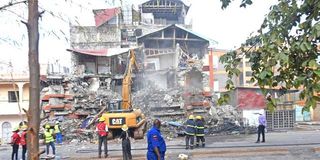Premium
So, how do we go about regulating the real estate industry?

The rubble of a five-storey building that collapsed in Ruaka, Kiambu County in 2022. Two people died.
The desire to own some form of real estate is, arguably, significantly higher in Kenya than in many other economies across the globe.
Part of the proof lies in the ever-growing number of property firms being registered in the country every other day.
While some of these companies are formed with the best interests of their clients at heart, some unscrupulous developers and land dealers form these companies with the intent of preying on ignorant buyers to obtain easy gains.
Cases of property firms that have either defrauded buyers looking to purchase land or houses are common. Statistics indicate that more than 60 per cent of all cases filed in courts are either land or property related.
Fraudsters mostly target buyers purchasing property in off-plan schemes. This is where buyers who may be unable to fully finance the purchase of a property at once, are provided with the option of paying for the property in bits and then waiting and see as it unfolds.
Fraudsters in these schemes have been exposed and even taken to court. Some of the companies that have recently been called out for allegedly defrauding buyers include Cytonn, Lesedi Developers, and Lettas Developers, which later rebranded to Banda Homes.
Upon conviction, directives for compensation have been issued, however, even before victims have started recouping their losses, the very same fraudsters have moved to form other property companies and gone on to sell to uninformed buyers the very same properties that are under scrutiny.
A big number of developers have indeed delivered on projects as agreed with their buyers and investors. To maximise their profits, however, some have engaged in all manner of unscrupulous practices to make sure that the cost of construction is way lower than the price at which they sell the property.
Collapsed buildings
Last year, several cases of collapsed buildings were reported in the media, with reasons for this ranging from the use of sub-standard building materials, poor compliance with specifications, faulty construction methodology, poor structural designs, poor quality control, foundation failure and corruption. In November last year, for example, a five-storey building under construction collapsed in Ruaka, Kiambu County, leaving three dead.
Just four days after this incident, another residential building collapsed in Ruiru, fortunately, its 140 tenants had been evacuated just hours before this happened.
A report by the National Construction Authority (NCA), states that over 87 buildings collapsed over the past five years, with an estimated 200 people losing their lives and over 1,000 getting injured in the process.
To curb the upsurge of cases of unprofessionalism in the real estate sector, including substandard construction and real estate fraud, the government has attempted to put in place a number of remedial interventions. For instance, there was the formation of the Kenya Real Estate Developers Regulatory Board, which was aimed at cutting off incompetent developers by ensuring that only registered and licensed developers were allowed to operate.

The National Construction Authority has suspended the building of 400 structures so far.
The board was also mandated with providing a quick and efficient dispute resolution mechanism between developers and aggrieved home buyers. By safeguarding the interests and deposits of investors and buyers, the board also sought to revive investor confidence in the country. Indeed, while there are many factors that make Kenya an attractive destination for business, extensive corruption has continually eroded investor confidence.
This corruption has found its way into some of these very regulatory bodies, where rogue officials have taken payments from developers looking to cut down on the cost of construction, or even bypass necessary approval and registration processes altogether.
Rogue state officials
Some developers have even claimed that the bureaucracy and delays witnessed in approval and registration processes have been instigated by state officials looking to frustrate projects and therefore demand payments in order to expedite approvals.
Many of these developers have complained that delays in the approval and registration of projects have stopped them from delivering projects in a timely manner, therefore creating conflict with their buyers and investors.
The government, however, has been quick to dismiss these claims, stating that, because many of the regulatory processes have now been digitised, the approval process has not only been made easier but also more transparent, therefore the only factor stopping some developers and contractors from complying is pure negligence.
“You do not even have to walk to NCA offices to get a compliance certificate. Sit in the comfort of your home, open your laptop, visit our official website, and apply. It is free of charge, but compliance is still at a worrying 40 per cent,” notes Eng. Maurice Akech, who is the executive director of the National Construction Authority.
The authority has the mandate of accrediting, registering and regulating the professional undertakings of contractors in the country. Aketch says that while the causes of collapsed buildings may range from poor workmanship, lack of professional supervision during construction, sub-standard building materials, negligence and geological weaknesses, failure to comply with guidelines is the biggest issue facing the sector.
He adds that in some extreme cases, developers have obtained money from investors living abroad, and begun working on projects in remote areas to avoid detection or compliance. Authorities only come to be aware of such developments when they suddenly collapse. Meanwhile, others build in the cover of the night to avoid detection. Yet others, who may have not complied with all the regulations, set aside some form of compensation on-site, so that if a state official makes a surprise visit to inspect the site, then they could easily convince them to look the other way.
“Complying with statutory regulations is important not only because it helps to safeguard the lives of building occupants, but also because it helps to protect investments and boost the longevity and profitability of developments,” notes Aketch.
Lack of adequate information on credible and certified developers and contractors, as well as approved lands or buildings, has also made it difficult for investors and buyers to know whom they can work with and whom they should steer clear of. Aketch adds that investors and buyers can find out whether or not a developer is compliant by visiting the NCA website.
The authority publishes a register of contractors that contains the particulars of the construction firm, including the class of works and category for which the firm is registered.
Records digitisation
Currently, there are over 55,000 accredited contractors on the NCA website. The site also provides the public with information on approved, as well as suspended housing projects, therefore making it easier for investors and buyers to avoid buying into unregulated projects. Based on their website, the NCA has suspended over 400 projects to date.
Meanwhile, the Ministry of Lands has digitised most of its records.
Before entering into any real estate dealing, Kenneth Luusa, who is the chairman of the Kenya Property Developers Association (KPDA), says that it is wise for investors and buyers to seek legal advice from reputed law firms. These will guide you on whether an individual has the right to pass on titles, whether they have followed the proper procedures in terms of approvals, and whether funding is in place. In a nutshell, some due diligence is key for any successful real estate undertaking.

Kenneth Luusa is the chairman of the Kenya Property Developers Association.
“It is always advisable for buyers to seek legal advice. While you will part with some money for this, a legal team will help you to do a background check on the developer, reducing the chances of you losing even more money when dealing with fraudulent developers,” notes Luusa, adding that in steering clear of unscrupulous dealers, the buck does not necessarily stop with the regulatory bodies, however, it is the responsibility of every individual to make sure they do not fall victim to fraudsters.
“Even though we have very elaborate laws against people committing fraudulent acts, it still does not stop them from committing acts of fraud. The government will provide the laws and enact the statutes, but at the end of the day, it starts with ourselves, if we do not act diligently, then we have a problem,” notes Luusa.
He adds that the judicial system also has a key role to play in protecting buyers by making sure that dealers who have been convicted of unscrupulous dealings are brought to justice, adding that making an example of a few unscrupulous dealers will in itself send the message that the market and the stakeholders are not willing to tolerate any kind of fraudulent behaviour.
“We know of people who have been reported time and time again but nothing seems to be happening to them. Some developers have set up companies, delivered nothing, then gone on again to set up new companies with the same intent of swindling people of their money, and they are still out there running scot-free. As long as mischievous dealers are allowed to continue operating, then it sends the wrong signal and also gives the industry a bad image,” notes Luusa, adding that there is a need for stakeholders to come together and collectively condemn the few developers who have failed, ignored or neglected to follow established construction guidelines and to co-operate with regulatory agencies, therefore endangering the lives of others and in the process, besmirching the reputation of other responsible developers.
He argues that protecting the lives and properties of Kenyans is not the responsibility of any one organisation, rather, it is a collective responsibility and everyone has a part to play in reining rogue players in the market.
“There are various actors involved, and the developer is just one of the players in the whole cycle. Banks are involved, the government is involved at the regulatory level, and we also have other professionals such as lawyers. It’s a series of key actors that come to play, so when things go wrong, they should not be pinned on just one actor. We all have a collective role to play in curbing fraud,” insists Luusa.
He says that conducting regular and collective training and sensitisation campaigns is also key to ensuring that people are not non-compliant simply because they are not aware of new laws that may have been implemented.
“In some cases, you may find issues coming up because someone was stuck in the process, whether that is in registration, or maybe there was a delay because they did not know which documents to submit. This is something that can be cured by a bit of training and information sharing.”
Ultimately, developers need to understand the value of a good reputation. There is a lot of money to be made in the industry, and the only way to build a business that lasts is to deliver your promise to your clients.
“You are only as good as the last project that you have done, therefore if you are looking to become an established developer, then your reputation is really your key asset, your stock in trade. If you have a bad reputation, then you will not survive in this market,” advises Luusa.





